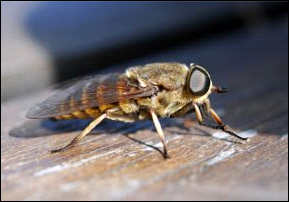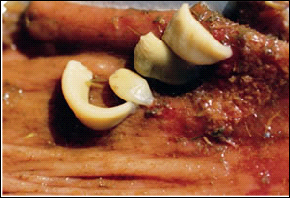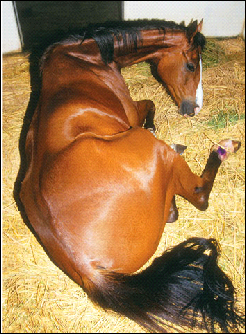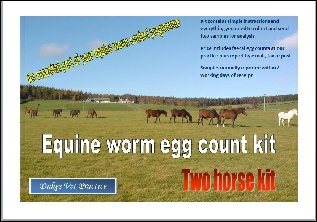
0345 095 9995 Out of hours call 07966 367746
© Dukes Vet Practice 2013, 2014, 2015

Dukes Equine Vets Ltd
Worm and other parasite control
Internal parasites of the horse include roundworms, tapeworms and bot fly larvae. All of these internal parasites have a lifecycle outside the host and these life cycles are remarkably different for each. 
The bot fly larvae turns into a big wasp like fly that lays those little yellow eggs seen on the legs of horses in the summer. Adult bot flies do not seem to survive in Aberdeenshire but any horse coming from further South may still have some larvae in their stomachs. Despite sounding quite unpleasant these larvae are not thought to cause the horse much harm but can be readily treated by dosing with an ivermectin class wormer in the winter months.
Tapeworms were also previously thought not to cause much problem but there is now a strong correlation between tapeworm larvae and various colics. We blood test a lot of colics looking for evidence of tapeworms and it’s amazing how many are positive. Most tapeworms have an intermediate as well as a final host. The horse is the final host and tapeworm eggs are passed out in the faeces. However they are not shed all the time so to find evidence of infection a blood sample can be taken.

Tapeworm eggs are then ingested by microscopic forage mites which are present on pasture but also in hay and straw. Once ingested the eggs go through a development stage in the forage might before they can infect another horse. The horse then ingests the infected mites when eating grass or hay and the tapeworm develops in the horse.
Tapeworm can be treated by twice yearly worming with a suitable product. Don’t forget them and focus entirely on roundworms!
Finally we come to round worms which are potentially the most serious and in some cases life threatening to horses. There are several important species of roundworm but the most important in the UK currently are thought to be small redworms or cyathostomes.
Eggs are passed onto pasture in the faeces where they must undergo several development stages before they can re-infect horses as L3 larvae. Once ingested these larvae end up in the large intestine where they either grow on and develop to adult cyathostomes and re start the lifecycle or they can “encyst” in the gut wall where they can remain for long perods before emerging to complete their development. They can cau se problems firstly by sheer numbers in the gut causing irritation, inflammation and colic, and secondly if large numbers of encysted larvae emerge together they can cause a severe and sometimes fatal diarrhoea.
se problems firstly by sheer numbers in the gut causing irritation, inflammation and colic, and secondly if large numbers of encysted larvae emerge together they can cause a severe and sometimes fatal diarrhoea.
For many years people have been routinely (de) “ worming” horse with various products but now the worms have developed significant resistance to many anthelmintics.
(Faecal) Worm egg counts are becoming increasingly popular as a means of monitoring the roundworm burden of horses. Performing a worm egg count allows us to make an informed decision on whether to worm a horse or not. There are two main advantages to doing worm egg counts rather than worming routinely; first, it is generally cheaper to do worm egg counts rather than worming and, second, it reduces the amount of drugs used and therefore reduces the rate of drug resistance.
 We provide sampling kits with everything necessary to collect and submit samples to us for faecal egg counts for your horse.
We provide sampling kits with everything necessary to collect and submit samples to us for faecal egg counts for your horse.
If everything is going well your horses’ worm egg counts will be at or close to zero at every count. However this is very unpredictable and we occasionally see some very high counts.
We usually recommend treating any horse with a single count over 150 eggs per gram, although there is no universally accepted safe minimum worm burden. However current thinking suggests that a low level of pasture burden may help some horses develop immunity. Achieving zero worms may be neither necessary nor desirable.
Do not panic if some of the horses have high faecal egg counts but look at the results and use this information to monitor and improve your parasite control program.
If you get some high counts use the following checklist to identify possible weak areas
1 Are all new horses wormed on arrival for both round and tapeworm?
2 Do you worm them with a wormer designed to treat encysted strongyles?
3 Are all horses regardless of worm counts given a treatment for encysted strongyles in December or January?
4 Are all horses wormed for tapeworms twice a year?
5 What pasture management systems do you operate and could this be improved?
If the answer to any of the first four questions is no or the fifth question is yes then these give you clues as to where you may need to change you management system. In all cases if you suspect you have a problem you should discuss your results and concerns with your vet.





